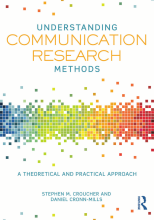Research Paradigms - The Social Scientific Paradigm - Social Science Defined
6 important questions on Research Paradigms - The Social Scientific Paradigm - Social Science Defined
What is social sciences?
What is of utmost importance for social scientists?
What is first step of the scientific method and what does it entail?
- Higher grades + faster learning
- Never study anything twice
- 100% sure, 100% understanding
What is the second step of the scientific method and what does it entail?
What is the third step of the scientific method and what does it entail?
1. Empiricism= researcher can only research what they can observe.
2. Objectivity= the need for a researcher to be sure his emotions and personal feelings do not interfere with his research. All researchers should recognise that the choice of method they make is a subjective choice.
3. Control= the researcher makes sure personal biases and other influencing variables do not interfere with a project (or at least tries to prevent this).
What is the fourth step of the scientific method and what does it entail?
The question on the page originate from the summary of the following study material:
- A unique study and practice tool
- Never study anything twice again
- Get the grades you hope for
- 100% sure, 100% understanding































